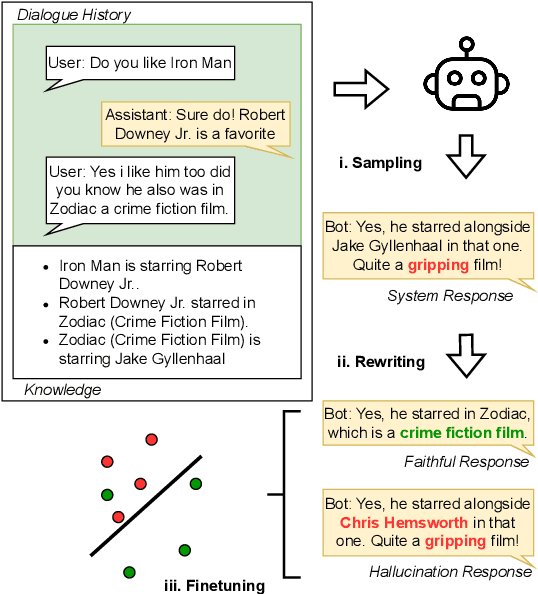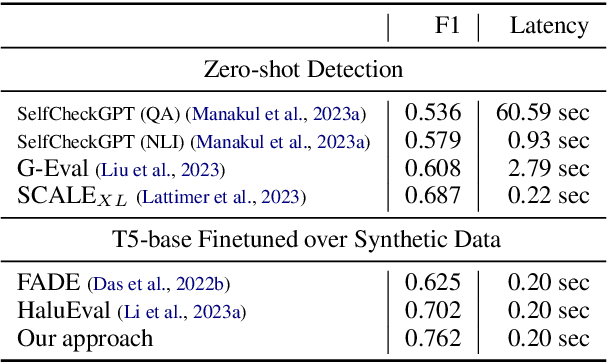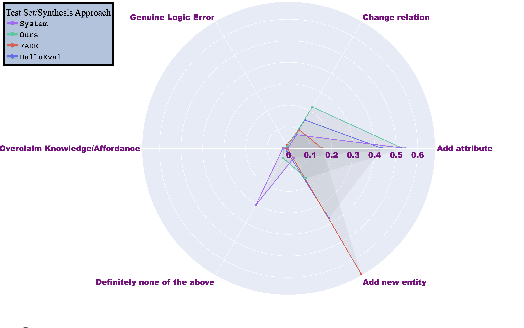Barrett Martin Lattimer
Sparse Rewards Can Self-Train Dialogue Agents
Sep 06, 2024



Abstract:Recent advancements in state-of-the-art (SOTA) Large Language Model (LLM) agents, especially in multi-turn dialogue tasks, have been primarily driven by supervised fine-tuning and high-quality human feedback. However, as base LLM models continue to improve, acquiring meaningful human feedback has become increasingly challenging and costly. In certain domains, base LLM agents may eventually exceed human capabilities, making traditional feedback-driven methods impractical. In this paper, we introduce a novel self-improvement paradigm that empowers LLM agents to autonomously enhance their performance without external human feedback. Our method, Juxtaposed Outcomes for Simulation Harvesting (JOSH), is a self-alignment algorithm that leverages a sparse reward simulation environment to extract ideal behaviors and further train the LLM on its own outputs. We present ToolWOZ, a sparse reward tool-calling simulation environment derived from MultiWOZ. We demonstrate that models trained with JOSH, both small and frontier, significantly improve tool-based interactions while preserving general model capabilities across diverse benchmarks. Our code and data are publicly available on GitHub.
Enhancing Hallucination Detection through Perturbation-Based Synthetic Data Generation in System Responses
Jul 07, 2024



Abstract:Detecting hallucinations in large language model (LLM) outputs is pivotal, yet traditional fine-tuning for this classification task is impeded by the expensive and quickly outdated annotation process, especially across numerous vertical domains and in the face of rapid LLM advancements. In this study, we introduce an approach that automatically generates both faithful and hallucinated outputs by rewriting system responses. Experimental findings demonstrate that a T5-base model, fine-tuned on our generated dataset, surpasses state-of-the-art zero-shot detectors and existing synthetic generation methods in both accuracy and latency, indicating efficacy of our approach.
Fast and Accurate Factual Inconsistency Detection Over Long Documents
Oct 23, 2023Abstract:Generative AI models exhibit remarkable potential; however, hallucinations across various tasks present a significant challenge, particularly for longer inputs that current approaches struggle to address effectively. We introduce SCALE (Source Chunking Approach for Large-scale inconsistency Evaluation), a task-agnostic model for detecting factual inconsistencies using a novel chunking strategy. Specifically, SCALE is a Natural Language Inference (NLI) based model that uses large text chunks to condition over long texts. This approach achieves state-of-the-art performance in factual inconsistency detection for diverse tasks and long inputs. Additionally, we leverage the chunking mechanism and employ a novel algorithm to explain SCALE's decisions through relevant source sentence retrieval. Our evaluations reveal that SCALE outperforms existing methods on both standard benchmarks and a new long-form dialogue dataset ScreenEval we constructed. Moreover, SCALE surpasses competitive systems in efficiency and model explanation evaluations. We have released our code and data publicly to GitHub.
Human Inspired Progressive Alignment and Comparative Learning for Grounded Word Acquisition
Jul 05, 2023Abstract:Human language acquisition is an efficient, supervised, and continual process. In this work, we took inspiration from how human babies acquire their first language, and developed a computational process for word acquisition through comparative learning. Motivated by cognitive findings, we generated a small dataset that enables the computation models to compare the similarities and differences of various attributes, learn to filter out and extract the common information for each shared linguistic label. We frame the acquisition of words as not only the information filtration process, but also as representation-symbol mapping. This procedure does not involve a fixed vocabulary size, nor a discriminative objective, and allows the models to continually learn more concepts efficiently. Our results in controlled experiments have shown the potential of this approach for efficient continual learning of grounded words.
 Add to Chrome
Add to Chrome Add to Firefox
Add to Firefox Add to Edge
Add to Edge